Christopher Allen's Blog, page 6
October 17, 2016
Walking and Cycling Bordeaux
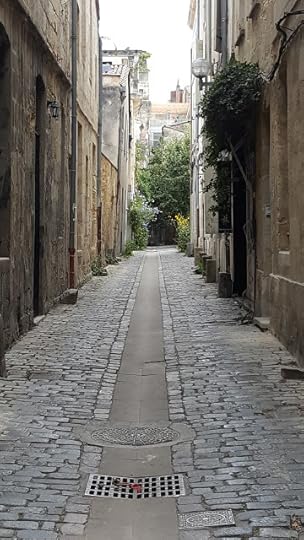 It's not really fair to a city like Bordeaux--to approach it with such dogged ignorance. But this is the way I travel: without preconceptions, without study. I just go. I must be off, so they say. The short answer to why I don't do (much) research before I travel is that I have no time for lengthy preparation; the long answer is that once I know a lot about something, I lose interest. God forbid I see pictures of the place.
It's not really fair to a city like Bordeaux--to approach it with such dogged ignorance. But this is the way I travel: without preconceptions, without study. I just go. I must be off, so they say. The short answer to why I don't do (much) research before I travel is that I have no time for lengthy preparation; the long answer is that once I know a lot about something, I lose interest. God forbid I see pictures of the place.So that's why when I get back from a weekend trip to Bordeaux I find out that the square where we sat enjoying the sun--eating nothing at a McDonald's table--is supposedly the largest square in Europe. Then a student tells me the mayor of Bordeaux will probably be the next President of France. Did you go to this or that unpronouncable place? Say, Chrandeauxlisémontéschwée pronounced Chuh? OK, I made that last one up, but you get the idea. There was some local must-try speciality, but it turns out it was liver and fried (so I wouldn't have eaten it anyway).
The advantage of visiting a city without the strictures of a guidebook is that you're less likely to see the city as a connect-the-dots tour of typical sights you've already seen and read about. I can't tell you what joy and trepidation turning a corner brings to me, not knowing what will be there. I'm lucky to be alive.
Hank the Cellphone Repairman's Assistant had the great idea of downloading a walking tour on his Android. We're modern guys. And we're walkers. Sometimes I walk 10 kilometers a day, so I'm all over the walking tour idea. Hank the Cellphone Repairman's Assistant is famous for his sense of orientation, so I'm also confident that he will be a great walking tour guide. After all, he has the tour on his Android. What could go wrong?
We set off walking toward the tour starting point, which I consider to be an excellent first move. Hank the Cellphone Repairman's Assistant, however, sees a Ferris wheel in the distance in the opposite direction. He needs to check this out before we start the walking tour.
"It's a Ferris wheel," I say in my bored voice. "And there's no one on it." Because no one rides Ferris wheels anymore.
"It's a Ferris wheel!" He goes skipping off like a puppy.
Oh god. It turns out that the Ferris wheel is only the tip of a carnival iceberg complete with real rides and a haunted house--and of course games! Shooting games, that game where you're never in a million years going to knock over all six tin cans, the one where parents watch their children catching ducks with a fishing pole (a most illogical game), and my favorite: the horse race where you advance your horse by rolling balls into the colored holes to win a giant stuffed pony. I'm pretty good at games and would love a stuffed pony, but Hank the Cellphone Repairman's Assistant, Ferris wheel lover, won't play.
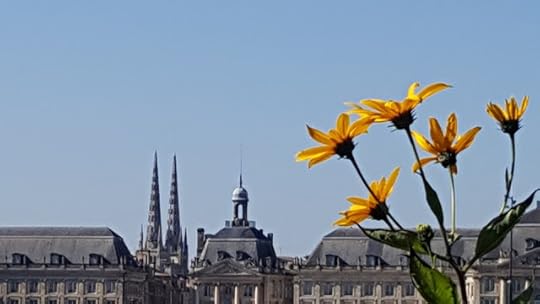
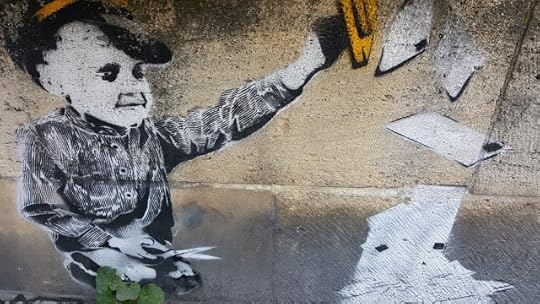
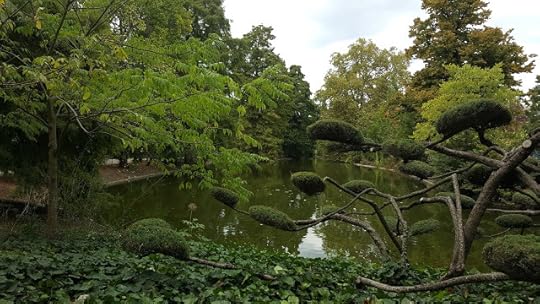
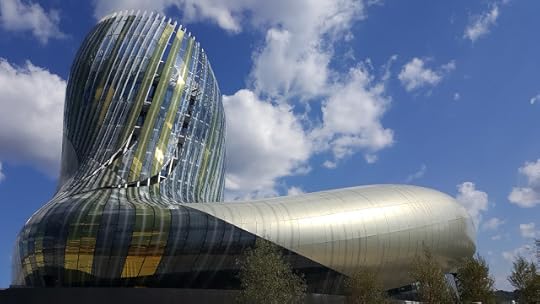
The end of the GPS walking tour is actually near the carnival, so we decide to do the walking tour backwards--which is coincidentally the story of my life. And so the walking tour begins (where it ends). To Hank the Cellphone Repairman's Assistant's credit, he's a brilliant tour guide for the first two stops. I place myself before the famous what-not and stare as Hank reads the text. It's some 16th-century building. Apparently, somebody used it for something pronounced wrong by Hank sometime around a million years ago. And onward. The next stop is very similar to the first stop. Somebody (pronounced wrong by Hank) did something a long long time ago, and then time moved forward, unlike us who are moving backwards. Hank has trouble finding the third stop, we make a wrong turn, wander from rue to câlé to carrent, end up at a Starbucks. The coffee is good. But the walking tour is over.
"You're a sucky tour guide," I say.
"I found a Starbucks."
"I actually found the Starbucks."
"Touché," Hank the Cellphone Repairman's Assistant does not say.
(French. Do you really need to speak French these days in France? Of course you need to try. You need to practice common phrases, be able to order your vin and your viande. These days, however, lots of younger people in France have no trouble communicating in English and are really very happy to do so. It's ridiculous to think that you need to learn every language of every place you visit. It's just not possible. Learning some basics can be fun, though. I've found a nice app for that called Duolingo.)
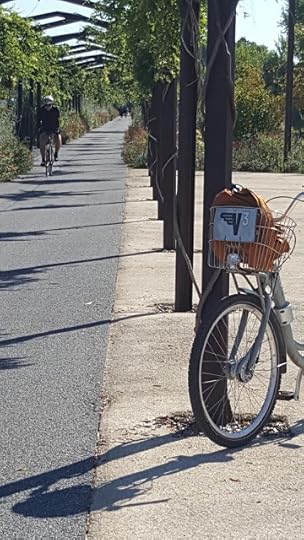
Since the walking tour was a bust, I decide we're going to do a biking tour of Bordeaux and beyond the next day. I won't bore you with the details, but if you read the above walking tour train wreck and simply replace "walking" with "biking", you'll get the picture.
"You're a sucky biking tour guide," I say.
"I found the--"
"Don't even try."
Seriously, a biking tour in principle (without Hank as the guide) is a great way to see Bordeaux. We cover a lot of ground--motorways, the busy promenade on the Garonne river, derelict trails, dangerous neighborhoods, the dump--so I guess I should be grateful for having had the opportunity of seeing "the other side of" Bordeaux. Again: lucky to be alive. More about biking in Bordeaux next time.
While you're waiting to hear about our cycling snafus, why not check out a couple of stories of mine that have been recently published? Checking out my stories has been proven to increase one's adorableness by a whopping 84%.
The Air Between Us
My Little Cuckoos
Target Practice
I must be off,
Christopher
________________________________________________
Christopher Allen is the author of Conversations with S. Teri O'Type (a Satire), an episodic adult cartoon about a man struggling with expectations. Allen's writing has appeared or is forthcoming in Juked, Eclectica Magazine's 20th-Anniversary Speculative anthology, Indiana Review, FRiGG, The Journal of Compressed Creative Arts, and over a hundred other great places. Read his book reviews in [PANK], Necessary Fiction, Word Riot, The Lit Pub, and others. His creative non-fiction has appeared in Chicken Soup for the Soul, Bootsnall Travel, and lots of other fine places. A finalist at Glimmer Train in 2011, Allen has been nominated for Best of the Net, the storySouth Million Writers Award, and the Pushcart Prize. He is the 2015 recipient of Ginosko Literary Journal's award for flash fiction and in 2016 took third place in the K. Margaret Grossman fiction award given by Literal Latté. Allen is the managing editor of SmokeLong Quarterly.
Published on October 17, 2016 05:02
October 10, 2016
An Interview with Graham Mercer, winner of the 2016 I Must Be Off! Travel Writing Competition
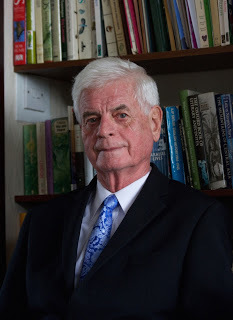 Graham Mercer was born and brought up south Lancashire, England. He spent nine years in the Royal Navy before becoming an elementary teacher. Mercer lived and taught for 34 years in Tanzania, East Africa where he met his Pakistani wife, Anjum. Now they live in north Cheshire, England. Interests include wildlife, writing, travel, reading, photography, cricket, the company of young people.
Graham Mercer was born and brought up south Lancashire, England. He spent nine years in the Royal Navy before becoming an elementary teacher. Mercer lived and taught for 34 years in Tanzania, East Africa where he met his Pakistani wife, Anjum. Now they live in north Cheshire, England. Interests include wildlife, writing, travel, reading, photography, cricket, the company of young people.__________________________
IMBO: First, Graham, congratulations on winning the 2016 I Must Be Off! Travel Writing Competition! We were fortunate to have many accomplished writers among the Top 18, long- and shortlists—and of course you were among these. You write mainly about Tanzania. What led you there?
Mercer: My father served in India during WW2 and the stories he told when he came back often involved the jungle and its wildlife. As a young boy I was entranced, especially by the “big game” animals such as tigers. My interest extended to East Africa and its own “mega-fauna”. As a young sailor with the Royal Navy my first ship, a survey vessel, took part in the International Indian Ocean Expedition 1962 – 64, based in Mombasa. I fell in love with Kenya and with life on safari. After qualifying as an Elementary teacher I was determined to go back to East Africa and in 1977 got a job at the International School of Tanganyika in Dar es Salaam. I went for two years and stayed for 34.
IMBO: What adjustments did you have to make culturally in those first few years living in Dar es Salaam?
Mercer: When I first went to live in Dar the Tanzanian economy was doing a bungee jump – often you couldn’t buy the basics, such as bread and butter, let alone “luxury” goods. On safari we virtually lived on corned beef. There were shortages of petrol (driving after 2 pm on Sundays was in any case banned in Dar), occasional water shortages and power cuts. TV, incidentally, was also banned. But of course the ordinary Africans were much worse off – they made us, as expatriates, seem like wimps. This degree of poverty was distressing but the Tanzanians generally bore it all with typical stoicism and good humour. Having an African “household help” (or servant) was also hard to get used to but they needed a job and we were grateful for their support. The climate (for us) could also be gruelling for much of the year – there was no air-conditioning in the school then and only the bedroom in our flat had a/c. But again, compared to the Africans we lived quite comfortably.
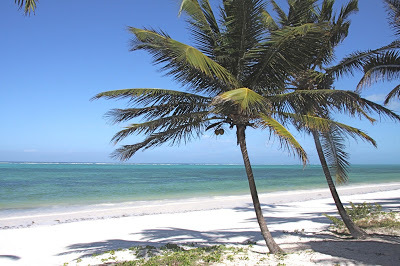 IMBO: During my youth in the American South, Zanzibar always represented that exotic place I’d never have enough money to visit. Now that I’m an obsessed traveler, I will at some point go to Zanzibar if I have my way. What are your feelings about the place and the people? How has the place changed over the last 20 years?
IMBO: During my youth in the American South, Zanzibar always represented that exotic place I’d never have enough money to visit. Now that I’m an obsessed traveler, I will at some point go to Zanzibar if I have my way. What are your feelings about the place and the people? How has the place changed over the last 20 years?Mercer: My first ship (mentioned above) was the first ship to arrive in Zanzibar harbour during the revolution there in 1964. I wasn’t aboard but later heard horror stories about the uprising. Thirteen years later I visited Zanzibar for the first time and found it fascinating. I have been many times since. On my first visit there were two hotels, now there are hundreds, around the coast and in the old Stone Town, which is (structurally) much the same as it was in the days of the sultans, the slaves and the famous explorers such as Livingstone and Stanley. It is my favourite part of Zanzibar though there are many beautiful beaches and excellent dive-sites. The island is very popular with honeymooners, but for more adventurous backpackers etc its sister island Pemba is worth a visit also.
IMBO: Is Tanzania safe? What should tourists avoid doing there?
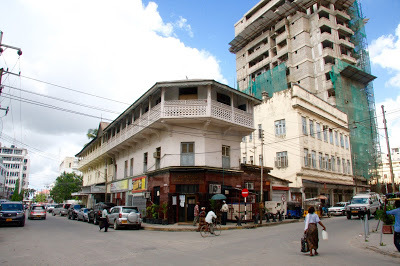 Mercer: I hardly had a security problem in 34 years though my wife was mugged and petty theft is quite common. Tourists and travellers need to use a bit of common sense, as you do in most places – don’t go around wearing expensive jewellery, don’t carry too much money, don’t walk around the back-streets etc at night, be aware of potential bag-snatching etc. etc. But don’t become paranoid either or what’s the point of being there?
Mercer: I hardly had a security problem in 34 years though my wife was mugged and petty theft is quite common. Tourists and travellers need to use a bit of common sense, as you do in most places – don’t go around wearing expensive jewellery, don’t carry too much money, don’t walk around the back-streets etc at night, be aware of potential bag-snatching etc. etc. But don’t become paranoid either or what’s the point of being there?
IMBO: There will be lots of young or new travel writers reading this interview. What advice can you give them about writing a successful travel article?
Mercer: I make no claims about my own writing but good writing is good writing, whether in a novel, an academic thesis or in a travel article. Make every word and sentence and punctuation mark count, be ruthless with your “purple prose” and with adjectives and adverbs and avoid “weasel words” – “really”, “basically”, “actually”, “very” etc. Be specific – don’t just say “trees”, say “Oaks or elms or Acacia tortillis”. Talk to the locals, look for interesting facts or places that others might have overlooked. Enjoy the cultural differences and the absurdities and your own misadventures but remember that it isn’t essentially about you, it’s about the place, the people and the experience. Edit, edit and re-edit – I must go through short articles about 50 times. The art of writing is as much about leaving things out as about putting things in. And try to hook the reader in the first few sentences. And to look for a different slant on things. Read good writers. Often. And never, ever, give up. Oh – and choose your travel partners wisely.
 IMBO: Excellent tips, Graham. How do you go about talking to locals? I’m shy or maybe just reluctant to make contact with other people. Any suggestions here to get me out of my shell?
IMBO: Excellent tips, Graham. How do you go about talking to locals? I’m shy or maybe just reluctant to make contact with other people. Any suggestions here to get me out of my shell?Mercer: I myself have always been very shy but when travelling I have always found the locals ready to talk if you approach them with some sensitivity (rather than poking a camera lens into their faces, for example). Fishermen, national park rangers, hotel staff, taxi-drivers, fellow-passengers on buses or trains, snake charmers, “dancing bear men” and Maasai “warriors” will often talk quite freely in my experience. In some places (India springs to mind) some individuals will even seek you out. A sense of humour is important. As a man I sometimes found it more difficult to talk to local women, especially Muslims, but once they know you are sincere they too will talk (though they won’t necessarily let you photograph them. Which is fine – don’t push them). My wife is Muslim (and talks to just about everyone) so in places like Zanzibar and Pakistan she was a great help. I think the secret is to be respectful, patient, genuinely interested and a good listener.
IMBO: If my information is correct, you’ve moved back to the UK. After so long in Tanzania, what culture shock are you experiencing?
Mercer: I find life here more comfortable but less exciting than life in Tanzania – for months after we came back I would walk through a local woodland keeping an eye open for elephants and looking for lion prints in the mud. And I miss the international nature of Dar es Salaam. Life here can sometimes seem trivial, also, after Africa, so many people seem to live their lives at second-hand, preoccupied with so-called “celebrities”, reality TV and material possessions. Bureaucracy is another issue (though it was bad in Dar also) – I seem to spend half my life filling in forms, responding to questionnaires (not this one!) and answering requests for information. Having said that we love being in England and there is much to see and do and be grateful for, so no complaints.
IMBO: Finally, some readers may have noticed that you and this year’s judge, Paola Fornari, both have a connection to Tanzania—which surprised you both.
Mercer: When I read about Paola’s background I was both intrigued and worried. Worried because I thought that in the unlikely event of me winning the competition she would be accused of “cronyism” when readers found out that she and I had spent so much of our lives in Tanzania. In fact we never met though our paths must have crossed many times. And thankfully, when she was judging the competition, she knew nothing of my own background. Fortunately too my article was not about Tanzania but Kashmir.
IMBO: Thank you for taking the time to talk, Graham. I wish you all the best.
Mercer: Many thanks, Chris. Not least for your part in organizing the competition. I think competitions like this provide wonderful opportunities for writers or would-be writers to improve their skills. Some people might think that writing 1,200 words is simple but it is much easier to write 12,000 words – the discipline and ruthlessness involved in cutting back your writing to the bare bones is a really valuable to a writer, whether he or she is short-listed or not.
_____________________________________________________
Christopher Allen is the author of Conversations with S. Teri O'Type (a Satire), an episodic adult cartoon about a man struggling with expectations. Allen's writing has appeared or is forthcoming in Juked, Eclectica Magazine's 20th-Anniversary Speculative anthology, Indiana Review, Night Train, The Journal of Compressed Creative Arts, and over a hundred other great places. Read his book reviews in [PANK], Necessary Fiction, Word Riot, The Lit Pub, and others. His creative non-fiction has appeared in Chicken Soup for the Soul, Bootsnall Travel, and lots of other fine places. A finalist at Glimmer Train in 2011, Allen has been nominated for Best of the Net, the storySouth Million Writers Award, and the Pushcart Prize. He is the 2015 recipient of Ginosko Literary Journal's award for flash fiction and in 2016 took third place in the K. Margaret Grossman fiction award given by Literal Latté. Allen is the managing editor of SmokeLong Quarterly.
Published on October 10, 2016 21:57
October 6, 2016
An Interview with the 2016 I Must Be Off! Travel Writing Competition Judge, Paola Fornari
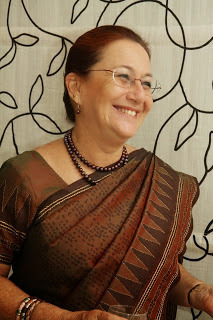 Travel writer Paola Fornari was born on Ukerewe Island in Lake Victoria, Tanzania. She has lived in a dozen countries over four continents, speaks five and a half languages, dabbles in several others, and describes herself as an expatriate sine patria. In every new posting, her curiosity leads her to explore every corner of her host country, and experience as much ‘real life’ as she can. Her travel and lifestyle articles have appeared extensively online, and in print magazines as diverse as Cycling World, Practical Fishkeeping, The Oldie and The Buenos Aires Herald. She has judged several writing competitions, and was co-judge in Expatclic’s prestigious Travel Reflections competition in 2013. In 2013 she won the Senior Travel Expert travel writing competition, and was third in the Go Walkabout competition. She joins me today to talk about her experience judging the 2016 I Must Be Off! Travel Writing Competition and to offer some tips for writers considering entering next year.
Travel writer Paola Fornari was born on Ukerewe Island in Lake Victoria, Tanzania. She has lived in a dozen countries over four continents, speaks five and a half languages, dabbles in several others, and describes herself as an expatriate sine patria. In every new posting, her curiosity leads her to explore every corner of her host country, and experience as much ‘real life’ as she can. Her travel and lifestyle articles have appeared extensively online, and in print magazines as diverse as Cycling World, Practical Fishkeeping, The Oldie and The Buenos Aires Herald. She has judged several writing competitions, and was co-judge in Expatclic’s prestigious Travel Reflections competition in 2013. In 2013 she won the Senior Travel Expert travel writing competition, and was third in the Go Walkabout competition. She joins me today to talk about her experience judging the 2016 I Must Be Off! Travel Writing Competition and to offer some tips for writers considering entering next year. ____________________________________
IMBO: First, thank you so much for judging the 2016 I Must Be Off! Travel Writing Competition. We were inundated with entries this year. It was a lot of work, and I’m very grateful to have had a judge who put so much passion into it. Do you feel as if you’ve been around the world and back with these stories? I certainly do.
Fornari: Indeed: with fresh eyes, I have revisited places I know, such as the mountain lakes of Dominica in the Caribbean and the Scottish Highland glens. I have even returned to my birthplace, Lake Victoria in East Africa. I have been transported to new places: coastal Albania, Iceland, Sumatra…but above all, I have had a gamut of experiences I would never have thought possible: I have smelt blood at a bullfight in Seville, counted turtles at dawn in North Carolina, felt the presence of the young Nelson Mandela in prison in Robben Island, tasted bakalarin Croatia, cruised down the Elbe, ducked missiles in Gedera in Israel, ridden in a hot air balloon in Burgundy, and even been shaken by an earthquake in Ecuador.
IMBO: After all these weeks we have finally revealed the winners, although each of the Top 18 is in some way a winner. It’s an insanely difficult question, but why did you choose Graham Mercer’s “Wild Encounter” to win first place?
Fornari: In his poem “Foreigners”, Cameroonian poet Ndjock Ngana writes:
‘…they go to Africato live in Europe:they go to Africabut they never get there.’
I was looking for stories that go beyond what you can read in a guidebook, beyond ‘If it’s Tuesday this must be Belgium’, beyond people snapping selfies in front of the Taj Mahal or going to a game park where rangers radio each other when they spot a rhino and tourists are more intent on ticking the Big Five off their lists than experiencing this exciting moment that will never again happen. I was looking for writers who ‘get there’, who make connections with the place they visit and the people they meet.
Once this criterion had been fulfilled, I scored every story against these questions:
• Was it interesting/entertaining/informative?• Was there a strong sense of place: did it transport me there through detail and description?• Was the angle original?• Was it well-written, which to me meant written in a clear, unfussy, unpretentious style?• Were the characters believable?• Was the story complete, rather than something that read like a blog extract?
Many stories fulfilled all these criteria, so I added another, perhaps more subjective one: on a scale of one to ten, how much did it wow me? This meant did it make me laugh out loud? Did it give me goose bumps even on the sixth reading? Did I lie awake at night thinking about it, feeling it with all my senses?
I was left with about half a dozen stories, and reread each of them several times.
Graham Mercer’s shone.
“Wild Encounter”has it all: the structure – opening with a fairy tale bear and ending with a terrifying real one – is superb. The characters are well-drawn ‘…Farouk says “Shalimar Gardens” with the joie-de-vivre of a Southern Rail Guard announcing Clapham junction…’. The images are original ‘…a serrated, explosive snarl, like the momentary bite of a chainsaw ripping into teak.’ The language is economical, and the sparing brushstrokes of detail haunting: ‘glib-tongued charm’, ‘stippling the still waters’, ‘raddled, hatchet-faced features’, ‘mouldering, mushroomy decadence’, ‘a golden oriole is pouring out its melancholy, fluting call’. I giggled at Ali Mohamed’s ‘wipers’…and wept with relief and joy each time I read this sentence: ‘And time remembers to tick and hearts to beat’.
IMBO: Can you give some general advice to writers entering contests like the I Must Be Off! competition?
Fornari:
• First of all, and this may seem obvious, read the guidelines carefully, and comply with them. Many competition entries (such as one particular near winner in this one!) are disqualified because they are not in line with the guidelines: they have been previously published, or are over the prescribed length. This is such a pity, because it can be easily avoided, and just wastes a lot of time and effort.
• Research your judge. Of course, judges are as objective as possible, but they are human: finding out what your judge is passionate about can only point your creativity in the right direction. • Get to the point quickly. If your story is about learning to make rum punch in the Caribbean, or climbing Kilimanjaro, we don’t need to know about your plane journey to get there, or your Skype call to your mother, or what the hotel receptionist said to you that morning. Start right into the action. In this competition, unfortunately, I eliminated a lot of good stories because the preamble was too long and I was bored by the time the real story started.
• Don’t feel obliged to tell the truth, the whole truth, and nothing but the truth. Leave out details that don’t contribute to the whole. The reader doesn’t really care that your Auntie Gladys was with you if she didn’t say or do much. You can even leave out the guide, if he or she isn’t particularly interesting: let’s just have you out there, making connections in your new place. Omit the fact that the bus stopped and you all piled out to have a cheese sandwich, if the stop and sandwich aren’t relevant and don’t move the action on. As a writer, you are allowed to be creative in order to end up with a better story.
• Put yourself in the mind of your readers – will they understand where you are, for example? Don’t assume they know where Brong Ahafo is just because you do: you don’t want to break the flow of the story by obliging them to switch to Wikipedia to check information.
• Don’t pepper your story with too many foreign words. A few go a long way to create atmosphere. Make sure you get them right. Misspelt foreign words show carelessness and, in my opinion, disrespect for other cultures.
• Use speech tags sparingly. And use simple ones. Dialogue is great in a travel story: it can show empathy, anger, frustration, and so many other emotions. The occasional ‘Ahmed said’ helps us keep track. But it’s the spoken words that convey the emotion, not the ‘he reiterated/’she exclaimed’/’John hinted’ and so on. Excessive tags are unnecessary hurdles blocking the reader’s way. • Read, read, read. Read previous winners of the competition: this will give you a feel for what the organisers are looking for. Read winning travel stories on other sites. Read travel writers. And read your story aloud to yourself. This will help you pick up small errors in continuity, or big howlers. Perhaps you initially wrote your story in the past tense, then decided to change it into the present…but missed a few verbs. And read your story to a friend you can trust to give an honest opinion.
IMBO: Great tips, Paola! I couldn't agree more. What are you working on right now?
Fornari: For me, experiencing is more important than writing. I’m working on getting to know Ghana better. Did you know, for example, that the white-necked picathartes, a rare rockfowl that has no feathers on its head, is found here? My ambition is to spot one. I also want to learn more about the people who migrate to Europe from Ghana across the Sahara desert, looking for a better future. I want to study traditional Adinkra symbols, and get more practice in beading and making batiks. Maybe, inspired by this competition, I will look for turtles on Ghanaian beaches. I will organise a home stay in a village in the North. And if some of these experiences inspire me to write stories, that will be an extra bonus, and I will be delighted.
IMBO: Paola, I hope you’re able to have all these adventures and that they lead to some great writing. Thank you again for all the work you did for the 2016 I Must Be Off! Travel Writing Competition!
__________________________________________
Christopher Allen is the author of Conversations with S. Teri O'Type (a Satire), an episodic adult cartoon about a man struggling with expectations. Allen's writing has appeared or is forthcoming in Juked, Eclectica Magazine's 20th-Anniversary Speculative anthology, Indiana Review, Night Train, The Journal of Compressed Creative Arts, and over a hundred other great places. Read his book reviews in [PANK], Necessary Fiction, Word Riot, The Lit Pub, and others. His creative non-fiction has appeared in Chicken Soup for the Soul, Bootsnall Travel, and lots of other fine places. A finalist at Glimmer Train in 2011, Allen has been nominated for Best of the Net, the storySouth Million Writers Award, and the Pushcart Prize. He is the 2015 recipient of Ginosko Literary Journal's award for flash fiction and in 2016 took third place in the K. Margaret Grossman fiction award given by Literal Latté. Allen is the managing editor of SmokeLong Quarterly.
Published on October 06, 2016 15:36
October 4, 2016
Juked! Juked! Juked!
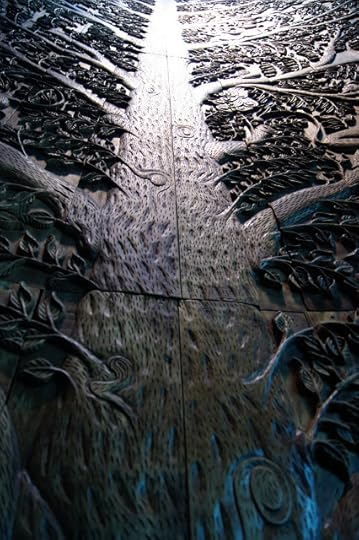 Hey, adorable IMBO readers! I have a new story in Juked today. You can read it online. Free. Totally free. Juked is such a great journal. Thank you so much to Ryan Ridge, Ashley Farmer and everyone else at Juked for giving "The Air Between Us" an incredible home!
Hey, adorable IMBO readers! I have a new story in Juked today. You can read it online. Free. Totally free. Juked is such a great journal. Thank you so much to Ryan Ridge, Ashley Farmer and everyone else at Juked for giving "The Air Between Us" an incredible home!This story all started with the oak tree in my back yard. Almost all of my story ideas come to me while I'm mowing the lawn. My neighbor hated my tree. The wind always blew (tons of) leaves into his yard. It still does, but the neighbor has sadly left this earth--he was a nice man actually. The real tree survives and thrives unlike the one in the story. Of course the neighbor has nothing to do with the story, but I hope you enjoy--or maybe feel unnerved, unsettled, maybe even deeply troubled by--it anyway. When my mother read it, the only thing she said was "Wow, that was intense." I'll take it!
The Air Between Us
______________________________________________
Christopher Allen is the author of Conversations with S. Teri O'Type (a Satire), an episodic adult cartoon about a man struggling with expectations. Allen's writing has appeared or is forthcoming in Juked, Eclectica Magazine's 20th-Anniversary Speculative anthology, Indiana Review, Night Train, The Journal of Compressed Creative Arts, and over a hundred other great places. Read his book reviews in [PANK], Necessary Fiction, Word Riot, The Lit Pub, and others. His creative non-fiction has appeared in Connotation Press, Bootsnall Travel, and lots of other fine places. A finalist at Glimmer Train in 2011, Allen has been nominated for Best of the Net, the storySouth Million Writers Award, and the Pushcart Prize. He is the 2015 recipient of Ginosko Literary Journal's award for flash fiction and in 2016 took third place in the K. Margaret Grossman fiction award given by Literal Latté. Allen is the managing editor of SmokeLong Quarterly.
Published on October 04, 2016 13:31
September 29, 2016
Announcing the Winners of the 2016 I Must Be Off! Travel Writing Competition
 First of all, each of the Top 18 entries in this year's competition deserves high praise. The entries on the long and shortlists also deserve recognition. We received so many memorable stories from writers around the world. Thank you to all 647 writers who entered the I Must Be Off! Travel Writing Competition. You made 2016 the biggest and most adventurous year yet for I Must Be Off!
First of all, each of the Top 18 entries in this year's competition deserves high praise. The entries on the long and shortlists also deserve recognition. We received so many memorable stories from writers around the world. Thank you to all 647 writers who entered the I Must Be Off! Travel Writing Competition. You made 2016 the biggest and most adventurous year yet for I Must Be Off!The Prize Recipients:
First Place -- "Wild Encounter" by Graham Mercer
Second Place -- "The Seven Headless Dwarfs" by Matthew Wolfe
The Readers' Choice Award (is more complicated):
The Readers' Choice Award is determined by the number of page views divided by the number of days online. The number of comments a post received comes into play only if there are entries that are very close in terms of page views. The top five entries in the Readers' Choice Award competition are as follows:
"A Kiss of Oranges and Myrtle on Crete" by Mihaela Lica Butler (winner)
1320 page views ÷ 10 days online = 132 (51 comments)
"A Glimpse of the Future Coming from the Past" by Paula Veselvoschi
2429 page views ÷ 20 days online = 122 (35 comments)
"A Very Cuban Lesson in Kindness" by Ruth Colmer
841 page views ÷ 13 days online = 65
"The Good Times Roll" by Maggie Downs
1245 page views ÷ 27 days online = 47
"A Day Out on the Death Railway" by Toni Marie Ford
661 page views ÷ 29 days online = 23
Congratulations to you all!
And to those readers/writers who didn't win this time or didn't enter, there's always next year. Get started early. Submissions will open sometime in the summer 2017. Be sure to check in here at I Must Be Off! in the next couple of weeks when I'll be talking to the judge of the year's contest, Paola Fornari. She gives some great tips for travel writing, so you won't want to miss this.
I must be off,
Christopher
__________________________________________
Christopher Allen is the author of Conversations with S. Teri O'Type (a Satire), an episodic adult cartoon about a man struggling with expectations. Allen's writing has appeared or is forthcoming in Juked, Eclectica Magazine's 20th-Anniversary Speculative anthology, Indiana Review, Night Train, The Journal of Compressed Creative Arts, and over a hundred other great places. Read his book reviews in [PANK], Necessary Fiction, Word Riot, The Lit Pub, and others. His creative non-fiction has appeared in Chicken Soup for the Soul, Bootsnall Travel, and lots of other fine places. A finalist at Glimmer Train in 2011, Allen has been nominated for Best of the Net, the storySouth Million Writers Award, and the Pushcart Prize. He is the 2015 recipient of Ginosko Literary Journal's award for flash fiction and in 2016 took third place in the K. Margaret Grossman fiction award given by Literal Latté. Allen is the managing editor of SmokeLong Quarterly.
Published on September 29, 2016 21:52
September 23, 2016
This is Jalala by Nadia Elkadri
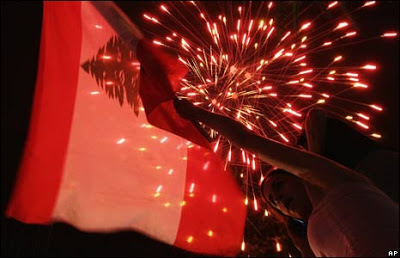 Photo: Associated PressAny horror is better than your own.
Photo: Associated PressAny horror is better than your own.It was our third scary movie in a row, and at this rate I knew I wouldn’t get any sleep that night. Seeing as sleep was a commodity in the region, I requested that my Movie Night friends could perhaps try watching something a tad lighter. I will never forget the looks they gave me. Horror movies were their standard fare, and it’s a sentiment shared by the the majority of the population. A great psychologist (whom I see every day in the mirror) once said, “People hide behind the things they are hiding from.” If my friends, my distant relatives, and all of those people I see queuing up for The Conjuring: Part 2 are all hiding behind horror movies, then the thing they are hiding from must be, theoretically, equally or exceedingly terrifying. What, I ask, can it possibly be?
Jalala is a small town in a small region in a small country that goes by the name of Lebanon. It’s smack-dab in the middle of Israel and Syria, who are embroiled in a centuries-old conflict that just happened to escalate. Bombings are the norm, and prepubescent soldiers roam the streets, their guns hardly drawing a glance. Travel advisories from all of the major countries hem and haw, but they all basically tell you the same thing: don’t touch the place with a ten-foot pole.
So here I am in Jalala, sitting on the porch that hasn’t changed in a decade. A plastic bag floats across the sky and my cousin, Rana, points it out, wryly asking me “See how beautiful Lebanon is?” The bag’s flight path is interrupted by a billboard advertising the army, which is fairly unnecessary considering the fact that the army’s presence can be felt around every corner. A four-wheeler blazes past, reluctantly carrying four fully grown adults. It is then and there that I learn the general rule of thumb regarding vehicles here: “fit as many people as there are wheels.” I am grateful to Rana for letting go of the awkward silence that threatened to overwhelm us ever since the morning when I compared bees stinging people to suicide bombers. The way she froze, you can tell I cracked their well-crafted façade of progress.
Lebanon is beautiful in its backwards simplicity.
Its beauty can only be seen in the light--not the oppressive sun or the stars and moon hidden by layers of pollution, but human-made light. Every technological advancement is embraced, albeit slightly unusually. Phones are used as flashlights to illuminate games of Basra, an Arab card game of skill and luck, during one of the myriad power outages. Video game consoles are used as mirrors to check on headdresses. Therefore, every night is set on fire in celebration of this light.
Fireworks take the place of stars in the night sky, and the day sky if the kids get too impatient to wait. They’re sold by convenience store owners that invariably have some sort of link to your family. They cause an insane amount of noise pollution, but in the town that boasts twenty-plus barking dogs at night, no one seems to care. In fact, the fireworks resemble explosions, and it’s common for visitors such as myself to duck and hide behind their grandmother’s berry tree (or so I was informed by my relatives between fits of laughter). Meanwhile, the locals don’t flinch. I wonder if this is because they are used to fireworks . . . or explosions.
The war lingers like an unwanted stray that you refuse to name in hopes that it’ll go away. Throughout my stay, I search for good things that came from everything that occurred. I land at a conclusion when I see the mobs of kids running amok in the streets, tolerated because the adults know they are reminders of an era in which you could give birth to nine kids, brimming with potential, and be left with one (or less) in a few years. Parents rejoice to have the resources to keep a kid alive. No one thinks of the baby boom that will affect their futures. Everyone lives in the present.
I am 15 years old. I’m at that age where everyone wants to know my plans for the future. I braced myself for the questions I was almost certain to receive in a room full of adults, prepared my answers to the word. To my surprise, they appeared unconcerned. It got to the point where I was “subtly” nudging the conversation towards college matters. When I saw their politely interested faces, I finally gave in. This is Jalala. They are determined to live each day individually, because that’s all they can do while keeping a brave face and their sanity.
Forget travel advisories; Jalala taught me the real advice. When I leave Lebanon, it will be like waking up from a nightmare that I’ll look back fondly upon. And then I shall smile and move on with my life.
____________________________________________
Nadia Elkadri is a 15-year-old aspiring lawyer and journalist who is still, unfortunately, in high school. However, she is making the best of that and her Canadian-Lebanese roots by making sure to explore both worlds. She loves to travel but planes scare her, so she has a bit of a dilemma.
Judge's Comment: Jalala, Lebanon. Twenty-two miles east of Beirut. Hardly top of many people's bucket lists. Even our writer admits travel advisories say 'Don't touch the place with a ten-foot pole'. But people, people like you and me, live in Jalala. Fireworks light up the sky. Adults play cards. Teenagers watch horror movies to mask the horror they are living. Kids play in the streets. And 'The war lingers on like an unwanted stray that you refuse to name in the hope that it'll go away.'
Published on September 23, 2016 05:52
This is Jalala by Nadia Elkadris
 Photo: Associated PressAny horror is better than your own.
Photo: Associated PressAny horror is better than your own.It was our third scary movie in a row, and at this rate I knew I wouldn’t get any sleep that night. Seeing as sleep was a commodity in the region, I requested that my Movie Night friends could perhaps try watching something a tad lighter. I will never forget the looks they gave me. Horror movies were their standard fare, and it’s a sentiment shared by the the majority of the population. A great psychologist (whom I see every day in the mirror) once said, “People hide behind the things they are hiding from.” If my friends, my distant relatives, and all of those people I see queuing up for The Conjuring: Part 2 are all hiding behind horror movies, then the thing they are hiding from must be, theoretically, equally or exceedingly terrifying. What, I ask, can it possibly be?
Jalala is a small town in a small region in a small country that goes by the name of Lebanon. It’s smack-dab in the middle of Israel and Syria, who are embroiled in a centuries-old conflict that just happened to escalate. Bombings are the norm, and prepubescent soldiers roam the streets, their guns hardly drawing a glance. Travel advisories from all of the major countries hem and haw, but they all basically tell you the same thing: don’t touch the place with a ten-foot pole.
So here I am in Jalala, sitting on the porch that hasn’t changed in a decade. A plastic bag floats across the sky and my cousin, Rana, points it out, wryly asking me “See how beautiful Lebanon is?” The bag’s flight path is interrupted by a billboard advertising the army, which is fairly unnecessary considering the fact that the army’s presence can be felt around every corner. A four-wheeler blazes past, reluctantly carrying four fully grown adults. It is then and there that I learn the general rule of thumb regarding vehicles here: “fit as many people as there are wheels.” I am grateful to Rana for letting go of the awkward silence that threatened to overwhelm us ever since the morning when I compared bees stinging people to suicide bombers. The way she froze, you can tell I cracked their well-crafted façade of progress.
Lebanon is beautiful in its backwards simplicity.
Its beauty can only be seen in the light--not the oppressive sun or the stars and moon hidden by layers of pollution, but human-made light. Every technological advancement is embraced, albeit slightly unusually. Phones are used as flashlights to illuminate games of Basra, an Arab card game of skill and luck, during one of the myriad power outages. Video game consoles are used as mirrors to check on headdresses. Therefore, every night is set on fire in celebration of this light.
Fireworks take the place of stars in the night sky, and the day sky if the kids get too impatient to wait. They’re sold by convenience store owners that invariably have some sort of link to your family. They cause an insane amount of noise pollution, but in the town that boasts twenty-plus barking dogs at night, no one seems to care. In fact, the fireworks resemble explosions, and it’s common for visitors such as myself to duck and hide behind their grandmother’s berry tree (or so I was informed by my relatives between fits of laughter). Meanwhile, the locals don’t flinch. I wonder if this is because they are used to fireworks . . . or explosions.
The war lingers like an unwanted stray that you refuse to name in hopes that it’ll go away. Throughout my stay, I search for good things that came from everything that occurred. I land at a conclusion when I see the mobs of kids running amok in the streets, tolerated because the adults know they are reminders of an era in which you could give birth to nine kids, brimming with potential, and be left with one (or less) in a few years. Parents rejoice to have the resources to keep a kid alive. No one thinks of the baby boom that will affect their futures. Everyone lives in the present.
I am 15 years old. I’m at that age where everyone wants to know my plans for the future. I braced myself for the questions I was almost certain to receive in a room full of adults, prepared my answers to the word. To my surprise, they appeared unconcerned. It got to the point where I was “subtly” nudging the conversation towards college matters. When I saw their politely interested faces, I finally gave in. This is Jalala. They are determined to live each day individually, because that’s all they can do while keeping a brave face and their sanity.
Forget travel advisories; Jalala taught me the real advice. When I leave Lebanon, it will be like waking up from a nightmare that I’ll look back fondly upon. And then I shall smile and move on with my life.
____________________________________________
Nadia Elkadri is a 15-year-old aspiring lawyer and journalist who is still, unfortunately, in high school. However, she is making the best of that and her Canadian-Lebanese roots by making sure to explore both worlds. She loves to travel but planes scare her, so she has a bit of a dilemma.
Judge's Comment: Jalala, Lebanon. Twenty-two miles east of Beirut. Hardly top of many people's bucket lists. Even our writer admits travel advisories say 'Don't touch the place with a ten-foot pole'. But people, people like you and me, live in Jalala. Fireworks light up the sky. Adults play cards. Teenagers watch horror movies to mask the horror they are living. Kids play in the streets. And 'The war lingers on like an unwanted stray that you refuse to name in the hope that it'll go away.'
Published on September 23, 2016 05:52
September 21, 2016
Finding Atlantis by Hal Ackerman
No summer will be remembered more passionately, in more vastly different ways that the summer of ‘69. Events that occurred within sixty days redefined the outer limits of humanity. In both directions. There was sublime peace and love at Woodstock. There were bloody corpses in Bel Air. Jimi Hendrix, Joni Mitchell/Charles Manson. Helter Skelter. Teddy drove Mary Jo off the bridge at Chappaquiddick. Neil Armstrong walked on the moon. And I went in search of Atlantis with the woman who would someday become my second ex-wife.
Oh yes. And there was Vietnam.
I had just written a searing political satire that I was certain would cause the entire American populace to rise up against the war, and that I would be my generation’s Aristophanes, our Jonathan Swift. Some unscrupulous people tried to wrest the play’s authorship from me, and in the end it was not done in the prestigious theater that would have been the pulpit to carry its message. It did not end the war. I did not become the voice of my generation. I needed to get away, and when I read about the dig I wrote to the director-general of antiquities for the Greek Ministry of Culture, Professor Spyridon Marinatos (whose name I still love to say out loud), informing him that I was an American photojournalist interested in visiting the site. Some part of that statement was close to being almost true. I was an American with a 35mm camera and writing implements.
The war was far more ferociously opposed in Europe than it was in the States. Every traveling American was held personally accountable. But in this two-week period from lift-off to landing, the other side of our national split personality captured the hearts and imaginations of the world. People broke out in smiles and celebrated us--“Americani! Astronauti! La Luna! La Luna!”
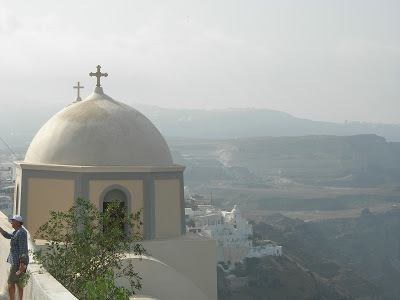 We were heading south through Italy to the port of Brindisi, where we would cross the Adriatic to the mainland of Greece, take a brief detour through the Peloponnesus, where I would make a pilgrimage to the theatre at Epidaurus, ancient home to Aeschylus, Sophocles and Euripides (the voices of their generations), then on to the port of Pireaus, from whence we would take an overnight boat to the island of Santorini.
We were heading south through Italy to the port of Brindisi, where we would cross the Adriatic to the mainland of Greece, take a brief detour through the Peloponnesus, where I would make a pilgrimage to the theatre at Epidaurus, ancient home to Aeschylus, Sophocles and Euripides (the voices of their generations), then on to the port of Pireaus, from whence we would take an overnight boat to the island of Santorini.
The boat left at dusk. We traveled deck passage amidst our guitar-playing, hash-smoking, moving glob of hippie cytoplasm. After six hours the engines stopped. We were a few hundred yards from shore in a lagoon that had once had been the caldera of the volcano that had erupted and split the island of Santorini in half, and, if speculation was correct, had buried Atlantis. Before us was a two-thousand-foot cliff that had been the center of the island. With the engines cut it was perfectly quiet. Moonlight shimmered across the lagoon. You did not have to be on acid to be on acid.
We were instructed (or herded) to climb overboardonto a small motor launch that carried us the last few hundred yards to the harbor. There, we were hustled onto the backs of mules that were prodded by muleteers who ran alongside their animals up the thousand-foot stone spiral staircase, prodding them with long sticks and a Greek word that sounded like ”delax.” The little whitewashed town rested at the top on a plateau, where innkeepers awaited the arriving tourists in a feeding frenzy of hospitality. Still. Compare that to the experience of a stranger getting off a bus or a train in ANY American city… at midnight. Would there be anyone to greet him but pimps and hustlers?
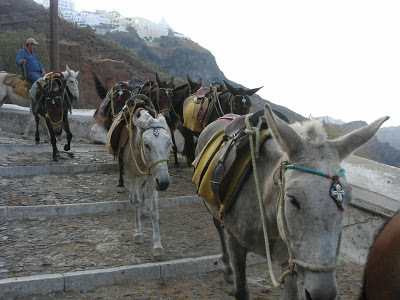 The dig was at the far end of the island at a site called Akrotiri. The bus went out there one day each week, which by our good fortune was the following day. The three-hour ride was over one-lane roads without guardrails, precariously terraced hundreds of feet above a sea that had already swallowed a continent. I had only seen archaeological digs in movies, where hundreds of workers wearing tan shorts and pressed shirts scurried around the hillside, showing their new amazing finds to the head scientist, who frequently exclaimed ‘eureka.’ When we got off the bus we found two guys with shovels and a wheelbarrow. Because this was grape growing country for world-famous Santorini wine, the excavation was being done so as not to disturb the crops. Rather than digging an open pit, they had tunneled underneath the farmland and made a cave. Long, witchy white-tipped roots dangled free and exposed into the hollowed space, like blind worms wriggling to find nourishment. It made me think a bit of how our marriage was starting to feel. When you fall out of love, everything is a metaphor. I’m sure she felt it too, but we were both smart enough or frightened enough not to say anything. There were no guardrails to break the fall into the ultimate truth that neither one of us wanted to face so far from home.
The dig was at the far end of the island at a site called Akrotiri. The bus went out there one day each week, which by our good fortune was the following day. The three-hour ride was over one-lane roads without guardrails, precariously terraced hundreds of feet above a sea that had already swallowed a continent. I had only seen archaeological digs in movies, where hundreds of workers wearing tan shorts and pressed shirts scurried around the hillside, showing their new amazing finds to the head scientist, who frequently exclaimed ‘eureka.’ When we got off the bus we found two guys with shovels and a wheelbarrow. Because this was grape growing country for world-famous Santorini wine, the excavation was being done so as not to disturb the crops. Rather than digging an open pit, they had tunneled underneath the farmland and made a cave. Long, witchy white-tipped roots dangled free and exposed into the hollowed space, like blind worms wriggling to find nourishment. It made me think a bit of how our marriage was starting to feel. When you fall out of love, everything is a metaphor. I’m sure she felt it too, but we were both smart enough or frightened enough not to say anything. There were no guardrails to break the fall into the ultimate truth that neither one of us wanted to face so far from home.
The bus had to return. There were no hotels within miles, meaning that we had to make the return trip on the very same bus, and that this entire trip will have been for half an hour. Either that or…well, there was no or. Maybe the workers sensed this. They allowed us to peek at the few artifacts that had already been unearthed. Among them, huge clay cisterns that once held olive oil. This was an early equivalent of the US Treasury’s repository of gold at Fort Knox. Ten years later there would be a huge twenty-page spread in National Geographic of the amazing treasures that dig had yielded.
We returned to Athens on July 20, 1969. By then we had forgotten about their voyage. I was lying on a metal army cot in a youth hostel in Athens. Men and women had separate accommodations. I splurged and went for “Very Especial,” which meant that the quarter-inch thick, stained mattress was covered by a semi-laundered sheet. It was too hot to sleep and around ten or eleven o’clock I went for a walk.
It wasn’t much cooler outside the youth hostel but at least there was a breeze. Presently I came upon a cluster of people gathered in front of a closed and locked appliance store. Inside the gated windows an eleven-inch black and white television set was turned on. There, in that fuzzy flickering image I saw Neil Armstrong set foot on Tranquility Base and utter the most famous misquoted line in history.
With all the strange smells and sounds around me, I felt as displaced and remote from my home planet as Armstrong was from his. I chanced to glance up. Above and behind the appliance store, in the same visual frame as the astronauts walking on the moon on that fuzzy TV screen, stood the Acropolis and the twenty-five-hundred-year-old Parthenon, its marble pillars gleaming in the light from the moon that was now being trodden for the first time in the life of the Universe. And tilting my neck up just a few more degrees, there was that very 4.5 billion-year-old moon. My own private trinity.
_______________________________________________
Until his retirement in 2015, Hal Ackerman served as co-area head of the UCLA screenwriting program. His first novel, Stein, Stoned, won the Lovey Award for best first novel in 2011. His short stories have appeared in New Millennium Writings, Southeast Review, (Winner there of Robert Olen Butler’s pick for World’s Best Short Short Story), and most recently in the current Idaho Review “Testosterone: How Prostate Cancer Made a Man of Me” won the William Saroyan Centennial Award for Drama, and was named Best Play at the 2011 United solo Festival in New York.
Judge's Comment: We are hooked at the start into what is to be both an archeological and a personal journey: it's 1969, 'And I went in search of Atlantis with the woman who would some day become my second ex-wife.' Wonderful evocation of the time: 'We travelled Deck Passage amidst our guitar-playing, hash-smoking, moving glob of hippie cytoplasm.' The description of the breakdown in the relationship is stark: 'There were no guardrails to break the fall into the ultimate truth that neither one if us wanted to face...' An oh so sad story, but with a beautiful, uplifting ending.
Oh yes. And there was Vietnam.
I had just written a searing political satire that I was certain would cause the entire American populace to rise up against the war, and that I would be my generation’s Aristophanes, our Jonathan Swift. Some unscrupulous people tried to wrest the play’s authorship from me, and in the end it was not done in the prestigious theater that would have been the pulpit to carry its message. It did not end the war. I did not become the voice of my generation. I needed to get away, and when I read about the dig I wrote to the director-general of antiquities for the Greek Ministry of Culture, Professor Spyridon Marinatos (whose name I still love to say out loud), informing him that I was an American photojournalist interested in visiting the site. Some part of that statement was close to being almost true. I was an American with a 35mm camera and writing implements.
The war was far more ferociously opposed in Europe than it was in the States. Every traveling American was held personally accountable. But in this two-week period from lift-off to landing, the other side of our national split personality captured the hearts and imaginations of the world. People broke out in smiles and celebrated us--“Americani! Astronauti! La Luna! La Luna!”
 We were heading south through Italy to the port of Brindisi, where we would cross the Adriatic to the mainland of Greece, take a brief detour through the Peloponnesus, where I would make a pilgrimage to the theatre at Epidaurus, ancient home to Aeschylus, Sophocles and Euripides (the voices of their generations), then on to the port of Pireaus, from whence we would take an overnight boat to the island of Santorini.
We were heading south through Italy to the port of Brindisi, where we would cross the Adriatic to the mainland of Greece, take a brief detour through the Peloponnesus, where I would make a pilgrimage to the theatre at Epidaurus, ancient home to Aeschylus, Sophocles and Euripides (the voices of their generations), then on to the port of Pireaus, from whence we would take an overnight boat to the island of Santorini. The boat left at dusk. We traveled deck passage amidst our guitar-playing, hash-smoking, moving glob of hippie cytoplasm. After six hours the engines stopped. We were a few hundred yards from shore in a lagoon that had once had been the caldera of the volcano that had erupted and split the island of Santorini in half, and, if speculation was correct, had buried Atlantis. Before us was a two-thousand-foot cliff that had been the center of the island. With the engines cut it was perfectly quiet. Moonlight shimmered across the lagoon. You did not have to be on acid to be on acid.
We were instructed (or herded) to climb overboardonto a small motor launch that carried us the last few hundred yards to the harbor. There, we were hustled onto the backs of mules that were prodded by muleteers who ran alongside their animals up the thousand-foot stone spiral staircase, prodding them with long sticks and a Greek word that sounded like ”delax.” The little whitewashed town rested at the top on a plateau, where innkeepers awaited the arriving tourists in a feeding frenzy of hospitality. Still. Compare that to the experience of a stranger getting off a bus or a train in ANY American city… at midnight. Would there be anyone to greet him but pimps and hustlers?
 The dig was at the far end of the island at a site called Akrotiri. The bus went out there one day each week, which by our good fortune was the following day. The three-hour ride was over one-lane roads without guardrails, precariously terraced hundreds of feet above a sea that had already swallowed a continent. I had only seen archaeological digs in movies, where hundreds of workers wearing tan shorts and pressed shirts scurried around the hillside, showing their new amazing finds to the head scientist, who frequently exclaimed ‘eureka.’ When we got off the bus we found two guys with shovels and a wheelbarrow. Because this was grape growing country for world-famous Santorini wine, the excavation was being done so as not to disturb the crops. Rather than digging an open pit, they had tunneled underneath the farmland and made a cave. Long, witchy white-tipped roots dangled free and exposed into the hollowed space, like blind worms wriggling to find nourishment. It made me think a bit of how our marriage was starting to feel. When you fall out of love, everything is a metaphor. I’m sure she felt it too, but we were both smart enough or frightened enough not to say anything. There were no guardrails to break the fall into the ultimate truth that neither one of us wanted to face so far from home.
The dig was at the far end of the island at a site called Akrotiri. The bus went out there one day each week, which by our good fortune was the following day. The three-hour ride was over one-lane roads without guardrails, precariously terraced hundreds of feet above a sea that had already swallowed a continent. I had only seen archaeological digs in movies, where hundreds of workers wearing tan shorts and pressed shirts scurried around the hillside, showing their new amazing finds to the head scientist, who frequently exclaimed ‘eureka.’ When we got off the bus we found two guys with shovels and a wheelbarrow. Because this was grape growing country for world-famous Santorini wine, the excavation was being done so as not to disturb the crops. Rather than digging an open pit, they had tunneled underneath the farmland and made a cave. Long, witchy white-tipped roots dangled free and exposed into the hollowed space, like blind worms wriggling to find nourishment. It made me think a bit of how our marriage was starting to feel. When you fall out of love, everything is a metaphor. I’m sure she felt it too, but we were both smart enough or frightened enough not to say anything. There were no guardrails to break the fall into the ultimate truth that neither one of us wanted to face so far from home.The bus had to return. There were no hotels within miles, meaning that we had to make the return trip on the very same bus, and that this entire trip will have been for half an hour. Either that or…well, there was no or. Maybe the workers sensed this. They allowed us to peek at the few artifacts that had already been unearthed. Among them, huge clay cisterns that once held olive oil. This was an early equivalent of the US Treasury’s repository of gold at Fort Knox. Ten years later there would be a huge twenty-page spread in National Geographic of the amazing treasures that dig had yielded.
We returned to Athens on July 20, 1969. By then we had forgotten about their voyage. I was lying on a metal army cot in a youth hostel in Athens. Men and women had separate accommodations. I splurged and went for “Very Especial,” which meant that the quarter-inch thick, stained mattress was covered by a semi-laundered sheet. It was too hot to sleep and around ten or eleven o’clock I went for a walk.
It wasn’t much cooler outside the youth hostel but at least there was a breeze. Presently I came upon a cluster of people gathered in front of a closed and locked appliance store. Inside the gated windows an eleven-inch black and white television set was turned on. There, in that fuzzy flickering image I saw Neil Armstrong set foot on Tranquility Base and utter the most famous misquoted line in history.
With all the strange smells and sounds around me, I felt as displaced and remote from my home planet as Armstrong was from his. I chanced to glance up. Above and behind the appliance store, in the same visual frame as the astronauts walking on the moon on that fuzzy TV screen, stood the Acropolis and the twenty-five-hundred-year-old Parthenon, its marble pillars gleaming in the light from the moon that was now being trodden for the first time in the life of the Universe. And tilting my neck up just a few more degrees, there was that very 4.5 billion-year-old moon. My own private trinity.
_______________________________________________
Until his retirement in 2015, Hal Ackerman served as co-area head of the UCLA screenwriting program. His first novel, Stein, Stoned, won the Lovey Award for best first novel in 2011. His short stories have appeared in New Millennium Writings, Southeast Review, (Winner there of Robert Olen Butler’s pick for World’s Best Short Short Story), and most recently in the current Idaho Review “Testosterone: How Prostate Cancer Made a Man of Me” won the William Saroyan Centennial Award for Drama, and was named Best Play at the 2011 United solo Festival in New York.
Judge's Comment: We are hooked at the start into what is to be both an archeological and a personal journey: it's 1969, 'And I went in search of Atlantis with the woman who would some day become my second ex-wife.' Wonderful evocation of the time: 'We travelled Deck Passage amidst our guitar-playing, hash-smoking, moving glob of hippie cytoplasm.' The description of the breakdown in the relationship is stark: 'There were no guardrails to break the fall into the ultimate truth that neither one if us wanted to face...' An oh so sad story, but with a beautiful, uplifting ending.
Published on September 21, 2016 05:28
September 19, 2016
A Kiss of Oranges and Myrtle on Crete by Mihaela Lica Butler
Ah, Crete, the Minoan cradle, that place of legend, where Basils of the world still hope for Zorba to teach them how to dance the sirtaki at Stavros. That iconic tune of “Zorba the Greek” still echoes here, with every kefi, for Cretans are born to dance, and they couldn’t care less that before 1964 there was no Zorba dance: they made it tradition, because – and any Cretan will tell you – it frees your inhibitions, and renders you happy from the opening gentle tunes, till your feet move so fast and so high that you feel like you could touch the skies with the hopping that seems to lift not only body, but the whole of your spirit. Oh, how I wanted to dance Zorba at Stavros! But my Cretan experience didn’t take me there.
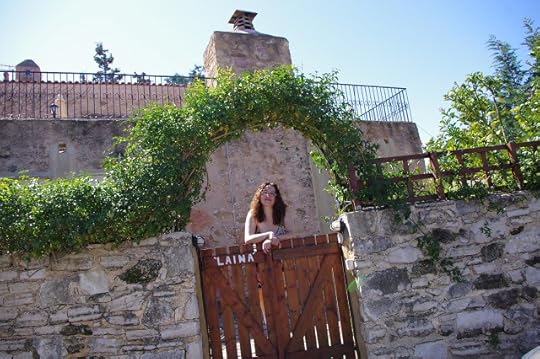
Crete was a lot of things to me that March – we visited off-season, since that’s when you can truly take in the soul of the island. Cretans have something most people don’t have – they call it filoxenia, the love for strangers, and it’s real, overwhelming – a powerful sentiment that brightness your day, from the first kaliméra. Filoxenia cannot be explained: it’s felt in their dance, it shines on their faces when they smile so openly welcoming you in their homes, treating you like family from the moment you arrive, till you leave and they part with a glitter of sadness in their eyes: “come back soon.”
We arrived on Crete on a stormy evening. The clouds raptured over Koules in Heraklion like impossible swarms of raging raindrops opening the heavens above with the light of Zeus’s mighty thunderbolts. The storm scared my little boy, Paul-Jules, and I remember telling him how the king of the gods was born on the island, and he watched me fascinated to learn how Zeus grew up in a cave, raised by a goat. Then we arrived at Lato Boutique Hotel, and we watched the storm raising the waves of the sea as high as the walls of the fortress from our windows. Paul-Jules was tired after the long trip, but, this being his first encounter with the sea, he watched the storm spellbound, holding an aromatic orange in the cup of his hands: “Mommy, this smells so pretty.” Funny what children seem to notice when no one else pays attention.
The second day, after the storm, we continued our journey: destination Metochi Villas in Platanias, not far from Chania. This was about to become our home-away-from-home, for the whole three weeks we had planned on the island. The ride to Platanias is the fondest recollection I have of Crete. The memory of the fragrant orange was still fresh in Paul-Jules’s mind, so as we drove, he exclaimed “Oranges!” every time he saw a vendor waiting patiently on the side of the road for a car to bring the next customer. “Mommy, please, can I have some?”
So we stopped – at random, as such things normally happen. A short, elderly woman, dressed in dark colors, with a black kerchief covering her head, was waiting patiently in the shade, by her improvised fruit stall. She promptly stood up when she saw me approaching. I wanted to buy a couple of oranges, but she only sold by the bag. I don’t know how many were supposed to be in a bag, but I quickly assessed about 20 big and bright organic oranges – at 5 € quite a bargain.
All I had in cash was a 10 € bill, and she had no small change – I was her first customers that day. I got a bag of oranges, and a couple of lemons, and handed her the bill, with a poorly pronounced efharistó, to let her know that I didn’t care for change. For a short while afterwards we spent time pushing the bill back and forth: she didn’t want to take the money, it was too much, she was trying to tell me, showing me that for 10 € I could buy two bags. I would have, gladly, but our rental car was already full, and there was simply no more room for so many oranges. So I insisted, with parakalo and efharistó, till she gave up, and accepted the bill.
Then, something strange happened. The old lady wept – tears in her kind eyes, and the feelings that enveloped my heart in the mystic of the moment are still strong today. Her expression, as she thanked me, was humble and gentle, reminding me of the look in my grandma’s eyes when she returned home with flowers and basil from the church: I believed that those offerings were sacred.
So I gave that old lady a hug, and the moment I embraced her, I felt her scent: she smelled holy, like myrtle and oranges, and also like olive oil, just like my own grandmother once. Without thinking, I gave her a kiss on her cheek, and I wiped her tears, smiling, repeating efharistó – the only word I knew, which seemed appropriate.
Then I walked to the car, opened the back door, took an orange out of the bag, and handed it to Paul-Jules, whose cheerful voice welcomed the gift with a loud “yay!” The old lady heard him, and waved. She followed me quickly, and as she approached, I saw she was holding as many mandarines as she could carry in her hands. She came to the back door, where Paul-Jules was busy sniffing the orange, and spoke softly, offering him the fruit. None of us could understand what she said, and I was too overwhelmed to say anything but “thank you.”
Then we drove away, leaving her there, alone by her oranges, and she watched us waving goodbye for a while, till we couldn’t see her anymore. Her scent of myrtle and oranges rubbed on my clothes, and I took it with me – in a sense it still follows me, and I feel that, in meeting her, I experienced the very essence of what filoxenia is supposed to be.
Meeting her triggered emotions that I had not expected: Crete felt familiar, safe, and warm, just like home. The look in her eyes reminded me of my childhood, a happy-go-lucky time under the loving care of my grandma. These feelings were so strong that for the next three weeks I didn’t feel like a tourist: I belonged there, I was supposed to make Crete my home.
Crete is today more than a cherished memory and a page in a travel diary: I left a bit of my heart in a kiss of oranges and myrtle, and I weep when I recall the scent of the woman whose kindness was the prelude of the best vacation of my life.
____________________________________________
Journalist Mihaela Lica Butler has built a career while chiming in on many topics, from relating the trials of the people of Kosovo, to experiencing first-hand the heroics of the soldiers serving for the UN. But she thrives in conveying her love for travel, cuisine, and places, in written word.
Judge's Comment: Here the writer builds a strong, instinctive bond with a stranger – a fruit seller – and shows us a first-hand instance of 'filoxenia', the inexplicable Cretan 'love for strangers' which is touchingly contagious. The story brings tears to my eyes each time I read it.

Crete was a lot of things to me that March – we visited off-season, since that’s when you can truly take in the soul of the island. Cretans have something most people don’t have – they call it filoxenia, the love for strangers, and it’s real, overwhelming – a powerful sentiment that brightness your day, from the first kaliméra. Filoxenia cannot be explained: it’s felt in their dance, it shines on their faces when they smile so openly welcoming you in their homes, treating you like family from the moment you arrive, till you leave and they part with a glitter of sadness in their eyes: “come back soon.”
We arrived on Crete on a stormy evening. The clouds raptured over Koules in Heraklion like impossible swarms of raging raindrops opening the heavens above with the light of Zeus’s mighty thunderbolts. The storm scared my little boy, Paul-Jules, and I remember telling him how the king of the gods was born on the island, and he watched me fascinated to learn how Zeus grew up in a cave, raised by a goat. Then we arrived at Lato Boutique Hotel, and we watched the storm raising the waves of the sea as high as the walls of the fortress from our windows. Paul-Jules was tired after the long trip, but, this being his first encounter with the sea, he watched the storm spellbound, holding an aromatic orange in the cup of his hands: “Mommy, this smells so pretty.” Funny what children seem to notice when no one else pays attention.
The second day, after the storm, we continued our journey: destination Metochi Villas in Platanias, not far from Chania. This was about to become our home-away-from-home, for the whole three weeks we had planned on the island. The ride to Platanias is the fondest recollection I have of Crete. The memory of the fragrant orange was still fresh in Paul-Jules’s mind, so as we drove, he exclaimed “Oranges!” every time he saw a vendor waiting patiently on the side of the road for a car to bring the next customer. “Mommy, please, can I have some?”
So we stopped – at random, as such things normally happen. A short, elderly woman, dressed in dark colors, with a black kerchief covering her head, was waiting patiently in the shade, by her improvised fruit stall. She promptly stood up when she saw me approaching. I wanted to buy a couple of oranges, but she only sold by the bag. I don’t know how many were supposed to be in a bag, but I quickly assessed about 20 big and bright organic oranges – at 5 € quite a bargain.
All I had in cash was a 10 € bill, and she had no small change – I was her first customers that day. I got a bag of oranges, and a couple of lemons, and handed her the bill, with a poorly pronounced efharistó, to let her know that I didn’t care for change. For a short while afterwards we spent time pushing the bill back and forth: she didn’t want to take the money, it was too much, she was trying to tell me, showing me that for 10 € I could buy two bags. I would have, gladly, but our rental car was already full, and there was simply no more room for so many oranges. So I insisted, with parakalo and efharistó, till she gave up, and accepted the bill.
Then, something strange happened. The old lady wept – tears in her kind eyes, and the feelings that enveloped my heart in the mystic of the moment are still strong today. Her expression, as she thanked me, was humble and gentle, reminding me of the look in my grandma’s eyes when she returned home with flowers and basil from the church: I believed that those offerings were sacred.
So I gave that old lady a hug, and the moment I embraced her, I felt her scent: she smelled holy, like myrtle and oranges, and also like olive oil, just like my own grandmother once. Without thinking, I gave her a kiss on her cheek, and I wiped her tears, smiling, repeating efharistó – the only word I knew, which seemed appropriate.
Then I walked to the car, opened the back door, took an orange out of the bag, and handed it to Paul-Jules, whose cheerful voice welcomed the gift with a loud “yay!” The old lady heard him, and waved. She followed me quickly, and as she approached, I saw she was holding as many mandarines as she could carry in her hands. She came to the back door, where Paul-Jules was busy sniffing the orange, and spoke softly, offering him the fruit. None of us could understand what she said, and I was too overwhelmed to say anything but “thank you.”
Then we drove away, leaving her there, alone by her oranges, and she watched us waving goodbye for a while, till we couldn’t see her anymore. Her scent of myrtle and oranges rubbed on my clothes, and I took it with me – in a sense it still follows me, and I feel that, in meeting her, I experienced the very essence of what filoxenia is supposed to be.
Meeting her triggered emotions that I had not expected: Crete felt familiar, safe, and warm, just like home. The look in her eyes reminded me of my childhood, a happy-go-lucky time under the loving care of my grandma. These feelings were so strong that for the next three weeks I didn’t feel like a tourist: I belonged there, I was supposed to make Crete my home.
Crete is today more than a cherished memory and a page in a travel diary: I left a bit of my heart in a kiss of oranges and myrtle, and I weep when I recall the scent of the woman whose kindness was the prelude of the best vacation of my life.
____________________________________________
Journalist Mihaela Lica Butler has built a career while chiming in on many topics, from relating the trials of the people of Kosovo, to experiencing first-hand the heroics of the soldiers serving for the UN. But she thrives in conveying her love for travel, cuisine, and places, in written word.
Judge's Comment: Here the writer builds a strong, instinctive bond with a stranger – a fruit seller – and shows us a first-hand instance of 'filoxenia', the inexplicable Cretan 'love for strangers' which is touchingly contagious. The story brings tears to my eyes each time I read it.
Published on September 19, 2016 05:51
September 16, 2016
A Very Cuban Lesson in Kindness by Ruth Colmer
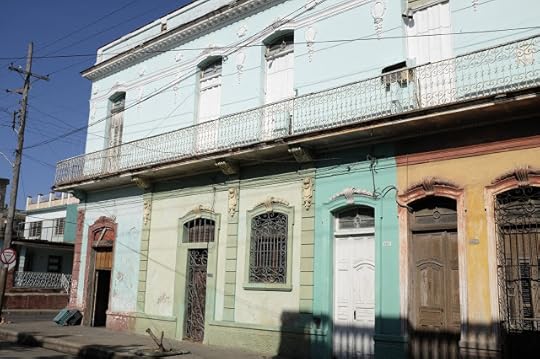 ‘I taught myself English, by candlelight, in the Jungle. In the Jungle!’ He repeats the last phrase with delight as if freshly astounded by the unlikeliness of his tale. This is only the second thing that Roberto has ever said to us, the first being the obligatory ‘Where are you from?’
‘I taught myself English, by candlelight, in the Jungle. In the Jungle!’ He repeats the last phrase with delight as if freshly astounded by the unlikeliness of his tale. This is only the second thing that Roberto has ever said to us, the first being the obligatory ‘Where are you from?’We are stood outside a grocery shop in the outskirts of Cienfuegos, gulping desperately from a bottle of agua mineral. Despite having been in Cuba for two weeks we still haven’t gauged just how much we need to drink in order to survive the midday sun.
‘Do you speak Spanish?’ he asks. I think I detect a hint of American in his accent. He looks healthy, buff, as if he’d just been plucked off a Miami beach and ended up 500 kilometres away still wearing his blue surfer shorts and a string of shells around his neck. My husband and I shake our heads in shame.
‘But why? It is easy.’
‘The English are lazy’, we say in weak retort. His face breaks into a Hollywood smile, teeth as white as a child’s. He talks on in statements, barely pausing for breath, the way one would if they had mastered another language but had no one to share it with. When the next question comes we are unprepared.
‘I would like to have coffee with you. Can we?’
His street is an architect’s playground with no two buildings alike. The houses are painted the colours of a nursery, faded mints, pinks and yellows strategically coating balconies, doors and shutters. Maximum effect with minimal resource. Just one car, a Soviet Lada in once cream, is parked jauntily on the kerb. I don’t think there is a viewpoint in Cuba from which you cannot spot a Lada. We stop outside a narrow, pink house, its front no wider than a kiosk.
‘I will tell Mama and Papa that you are here’, he says, vanishing through the open doorway.
We have only a few seconds to reflect on the rudeness of our unexpected arrival before Roberto reappears. It is only when he is fully outside that we realise his parents have followed, their tiny frames obscured until the last second when they spring out from behind him. Papa is shirtless revealing small sinewy arms and a near washboard stomach. He laughs, throwing his head back in delight, pats us on the shoulder and starts performing an exercise routine, bending his legs to a low squat with such ease and balance that even a yoga teacher would be proud.
‘Ochenta y cuatro’, he says, prodding his chest, ‘y ochenta’, he continues now pointing to Mama.
‘Ochenta’, she says, grinning and prodding her own chest to reinforce the message. Mama wears a nightie-like dress, thin, white and covered in a delicate pink flower print with large buttons leading up to the frilly, coral trimmed neckline. She has wide, watery green eyes and a ballerina-like posture, her arms slender and taut as if she has not changed size through all her 80 years.
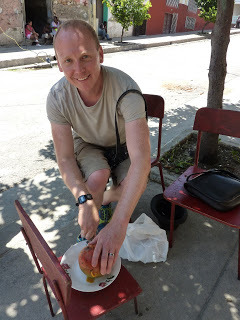 Roberto brings out a stack of metal framed chairs, the kind that you might find in the middle classrooms of a primary school. He carefully positions our chairs to fit the only available rectangle of tree shade and urges us to sit. I do so briefly but Papa’s boundless energy causes me to stand again. It doesn’t seem right to be more sedentary than an octogenarian. He dips into the doorway again and bounds out wielding a huge mango. He hands it to me. We all laugh.
Roberto brings out a stack of metal framed chairs, the kind that you might find in the middle classrooms of a primary school. He carefully positions our chairs to fit the only available rectangle of tree shade and urges us to sit. I do so briefly but Papa’s boundless energy causes me to stand again. It doesn’t seem right to be more sedentary than an octogenarian. He dips into the doorway again and bounds out wielding a huge mango. He hands it to me. We all laugh. ‘It is mango season’, Roberto tells me, ‘you will not get a better mango than this.’
Though hugely grateful I am unsure how to show my appreciation of its quality. I move it up and down like a nurse assessing a baby’s weight, surprised by how heavy it is. Papa smiles, nods, and gives one of his laughs. He’d laugh a whole lot more if he saw what passes for a mango in England.
We all watch as my husband tries to cut the mango. Papa advises in Spanish. I laugh, point, and take photos. The mango is delicious but eating it is a graceless activity. Papa’s eyes actually begin to water when he sees how much of the juicy flesh is smeared across my face. He even detects a bit in my eyebrow.
Shortly after, Mama brings the coffee, short, black and syrupy with sugar. Roberto explains that they moved to the city from the jungle due to Mama and Papa’s advancing years.
‘We need to be near the hospitals now’, he says, although looking at his parents it is hard to imagine them ever succumbing to the common illnesses and ailments associated with old age.
‘Tell us more about your excellent English speaking skills’, I say.
‘My brother got a job as a driver for the Russian’s’, Roberto explains. ‘They gave him a radio and he gave it to me. I would sit up at night tuning into the American stations, and by candlelight I would write down the sounds and practise. That’s what I did. That’s how I learned.’
Our conversation is interrupted by a shout from across the road. We turn to see a neon clad woman sat on a door step bellowing and waving her arms about. She sounds as if she is angry but then everyone begins to laugh.
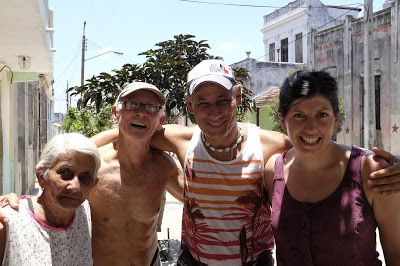 ‘She is after one of Mama’s coffees’, Roberto tells us. ‘There are houses here much bigger than this but it doesn’t matter’, he says, ‘everyone wants Mama’s coffee.’
‘She is after one of Mama’s coffees’, Roberto tells us. ‘There are houses here much bigger than this but it doesn’t matter’, he says, ‘everyone wants Mama’s coffee.’Bolstered by caffeine and sugar I try out some of my appalling Spanish. Mama and I have facilitated conversation about children. She tells me that of the 8 she has given birth to, only one was born in a hospital and, of all the births, 6 survived. There is no self-pity in her tone. I imagine these must be favourable survival statistics for childbirth far away from medical support or supplies.
Mama smiles continuously. She holds my hand and, every now and then, hugs me and kisses me on the cheek. Buena, she says nodding at my husband. No wonder everyone wants to hang out with Mama.
We ask Roberto about the whereabouts of his brothers and sisters. He waves his hand dismissively.
‘They have moved away’, he says, ‘but I stay to look after Mama and Papa.’
Papa prances past, moving fawn-like across the road to deliver a coffee to the shouting lady. He comes back and hugs us each in turn chuckling away as he does so. Then he puts his arm around Mama.
‘Ochenta y cuatro, y ochenta’, he whispers, ‘Ochenta y cuatro, y ochenta.’
_____________________________________________
Ruth Colmer lives in Brighton, UK, and is the author of the vegetarian food blog Figs & Fennel. She has travelled widely, her work in the charity sector having taken her to various destinations including Ethiopia, India and Bangladesh. She is a freelance researcher, evaluator, teacher and writer.
Judge's Comment: In this neatly structured story we meet Cuban generosity at its best through a chance encounter between the writer and a lively elderly couple. I fell in love with Papa, the man with the 'near washboard stomach'. What pride in his 'fawn-like' gait, what openness, what love, what joie de vivre. I want to be like Papa when I'm eighty-four.
Published on September 16, 2016 05:48



